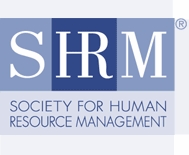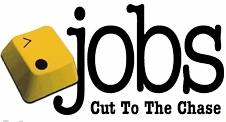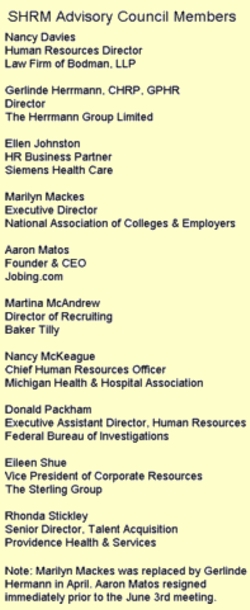 From the beginning, SHRM’s .jobs advisory council agreed to veil its meetings in secrecy, withholding its minutes and cloaking the names of speakers with numbers.
From the beginning, SHRM’s .jobs advisory council agreed to veil its meetings in secrecy, withholding its minutes and cloaking the names of speakers with numbers.
The minutes, released Wednesday, also show the council wrestled with the reasons why Employ Media, the registrar of the .jobs domain, was looking to expand its use and what value that expansion might offer the HR community.
 However, if the council at any time actually enumerated the specific benefits of allowing non-company names to be used with a .jobs extension, it is not shown in the minutes.
However, if the council at any time actually enumerated the specific benefits of allowing non-company names to be used with a .jobs extension, it is not shown in the minutes.
When the council voted 7-1 on June 3 it approved a measure declaring simply that the proposed amendment “would serve the needs of the international human resource management community.”
The dissenter was not identified. Nor do the minutes indicate the reason for the ‘No’ vote, except to note that the dissenter declared it had nothing to do with the resignation of Jobing CEO Aaron Matos minutes before the meeting.
Matos, who declined to provide me a copy of his letter, would only say that it “detailed my unhappiness with the process.”
It must have been fairly pointed, since it was the first item of business on the day of the vote. (A previous departure from the council by Marilyn Mackes, executive director of the National Association of Colleges and Employers, wasn’t even mentioned in the minutes.)
The Matos resignation was read by council manager Gary Rubin, SHRM’s chief of publications and e-media. Say the minutes: “Gary then read to the Council the entire letter of resignation from Aaron Matos. Mr. Rubin then rebutted various allegations made in the Matos letter.”
It is likely Matos made reference to some technical and contractual issues, since the minutes indicate council members dismissed the objections. “Council Member #3 believed that he/she was not called upon to serve on the Council as a technical or legal expert, but rather, to vote upon whether or not this amendment is a benefit to the HR profession,” the minutes note.
Early on, the council (officially known as the Policy Development Process Council, or PDP council) heard from Employ Media, which administers the .jobs issuance and is the driver behind expanding the allowable names. Tom Embrescia, CEO of Employ Media, outlined the firm’s proposal then, later in the teleconference, was joined by other executives to respond to questions.
The minutes reflect little of the give and take, though they note the issues revolved around the grant to Employ Media of the right to issue .jobs domains by the Internet addressing authority ICANN (International Corporation for Assigned Names and Numbers). A question about the financial implications for Employ Media was planned, the minutes note, but not asked.
 Council members are referred to by number in the minutes so it’s not known who asked some of the more direct questions about Employ Media registering names to itself.
Council members are referred to by number in the minutes so it’s not known who asked some of the more direct questions about Employ Media registering names to itself.
Such cloaking of speaker identities occurs throughout the meeting minutes. Indeed, at the group’s first meeting, Rubin listed a number of “housekeeping items,” one of which was, “The Council members should respect that Council meetings are closed, private sessions to enable all members to speak openly, freely, and candidly.”
The minutes of the council’s five meetings show the group periodically discussed the need to keep their deliberations private, going so far as to deny absent members access to recordings of the meeting.
At the April 30th meeting, which three of the nine members missed, the group discussed a request by one of the absentees to hear the taped proceedings. According to the meeting minutes:
“Council Member #9 noted that he/she has a problem with releasing the recording and how this could possibly be used if the public gets it Council Member #3 was also not comfortable about releasing the dialogue of the recording while we are still in the midst of the deliberation phase.”
At that meeting, the council discussed how it would solicit and receive input from the HR community. On the table was a focus group, a discussion board, and a scientific survey conducted by SHRM’s own research division. How, exactly, the focus group fit in isn’t clear, though there’s mention of one having been convened in Orlando.
In any case, the discussion board caused the council members the most trouble.
“Mr. Rubin suggested that perhaps we can open and publish the questions to anyone who wishes to answer but the responses should come back privately. Further, the public part is important so that the community feels that they have an opportunity to be heard. Ideally, it would be good for the comments to be seen publicly, but private comments would serve the Council better as far for receiving the information that the Council seeks and needs. The Council members agreed to make the questions public but the answers would only be visible to the Council.”
One other point about the process is worth noting. Council members were asked to subhmit a conflict of interest statement. Only two members indicated they had a conflictd — Matos and Nancy McKeague, senior VP, Michigan Health and Hospital Association. McKeague reported she had bought michiganhospitals.jobs, but let it lapse. Matos is founder, CEO, and an owner of a job board.
 Rhonda Stickley’s role as president of DirectEmployers Association was raised as a possible conflict. The minutes show she dismissed it, describing herself as “a figurehead or voice of the members of Direct Employers” and not an employee.
Rhonda Stickley’s role as president of DirectEmployers Association was raised as a possible conflict. The minutes show she dismissed it, describing herself as “a figurehead or voice of the members of Direct Employers” and not an employee.
DirectEmployers has been a major player in the expansion of the .jobs naming convention. Months ago, the organization began launching job boards with occupational and geographic names on the .jobs domain. It had planned to launch tens of thousands of these until ICANN stepped in.